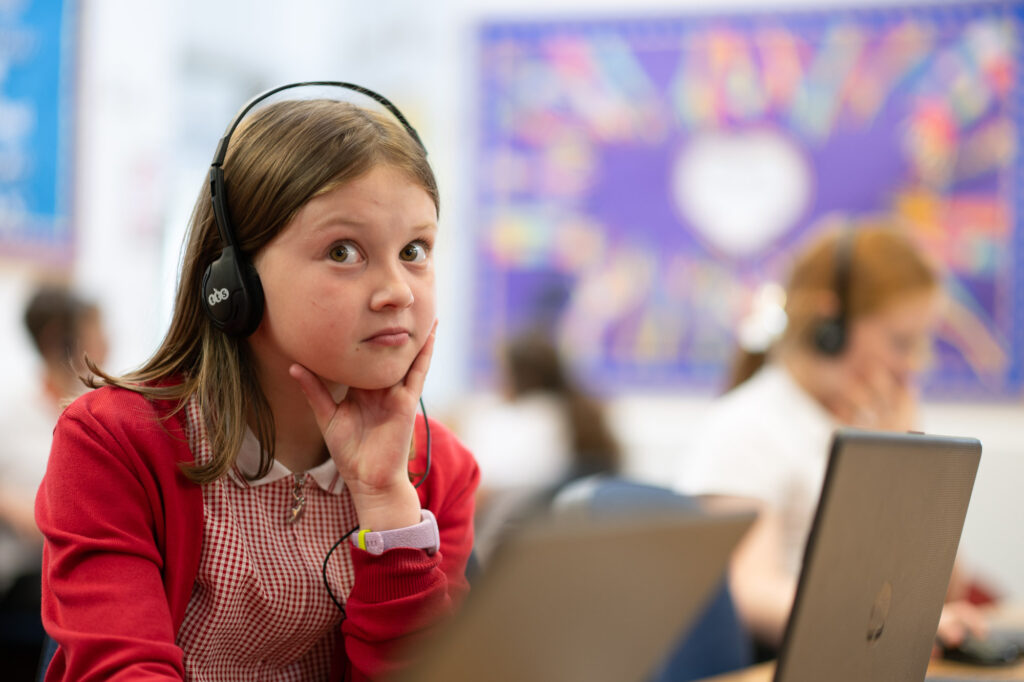Online Safety


What are the issues?
The internet – on the whole is an inspiring and positive place.
The internet is an amazing resource which enables children and young people to connect, communicate and be creative in a number of different ways, on a range of devices.
However, the internet is always changing, and being able to keep up to date with your children’s use of technology can be a challenge.
You may sometimes feel that your children have better technical skills than you do, however children and young people still need advice and protection when it comes to managing their lives online.
Issues that your child may encounter on the internet will vary depending on their age and online activities.
Resources for parents:
Advice on social media & staying safe
Parental Controls
Smartphones and other devices
Children are using devices at a younger age so it’s important to consider setting controls on their tech, or on any devices that you are letting them borrow from you. We’ve pulled together a number of guides to give you simple steps to set controls on a range of devices.
E-Safety Tips for Parents
InternetMatters.org is a not-for-profit organisation that has a simple purpose – to help keep children safe in the digital world.
Organisations and websites offering further information and support for online safety:
Be Share Aware –
Keep your child safe online
We tell our children it’s good to share – but online it’s different. In fact sometimes sharing online can be dangerous. Being Share Aware will help keep your child safe online.
Watch and share a short film and take a look at some straightforward advice that will untangle the web, and give parents confidence in talking to their children about how to stay safe online.
“Leaders are well trained and use their knowledge of special educational needs to identify specific requirements at an early stage and provide timely support.”
“Pupils listen to the opinions of others and are keen to offer their views considerately and respectfully.”
“The school’s work to promote pupils’ personal development and welfare is outstanding.”
“The school is a calm, orderly and purposeful place for pupils to make the most of their learning.”
“The broad curriculum provides a wide range of enriching experiences for pupils.”
“The school’s welcoming and caring ethos is central to its work in raising standards for
pupils.”
“In mathematics lessons, resources are used well to enable pupils to visualise abstract ideas and to get a more secure understanding of number.”
“Effective safeguarding procedures are in place. All staff have a clear understanding of how to keep pupils safe.”
“Parents and carers who offered their views to inspectors were overwhelmingly positive about the experiences of their children.”
“The profile of sport has been raised and more pupils now compete in sporting
activities.”
“From the moment pupils enter the school each day, they are greeted with respect and a genuine sense of care from the adults in the building.”
“Pupils behave well and are polite, articulate and respectful.”
“Governors are ambitious for the school. They challenge and support leaders effectively.”
“Teachers plan interesting activities that motivate the pupils. Staff ensure that all pupils are valued and included in learning.”
“Staff encourage pupils to be resilient and take risks. Pupils know it is all right to get things wrong and that this is part of the process of learning.”
“Learning in early years gets off to a good start. As a result of effective teaching and provision, children progress well from their starting points.”
“By the end of Year 6, outcomes are high in reading and writing. In reading, they are
particularly high.”
“The teaching of reading is good. There is a consistent approach to the teaching of
phonics.”
“Good teaching through early years and in key stage 1 ensures that the proportion of pupils passing the Year 1 phonics screening check is consistently above average.”
“The passionate and effective leadership of senior leaders and the commitment of the staff have sustained the good quality of education at the school.”
“In all key stages, pupils are now making good progress from their starting points in reading, writing and mathematics.”
“Older pupils develop a good understanding of what they read. Leaders promote a love of reading and pupils say the school provides them with high-quality texts.”
“Staff welcome the professional development they receive and say that this makes a real difference to the quality of their teaching.”
“The quality of teaching at Walkington Primary is underpinned by warm and caring
relationships between staff and pupils.”
“Governors have a good understanding of the school’s strengths and weaknesses and
are clear about priorities and plans for improvement.”
“Adults give pupils
opportunities to share ideas and challenge their own thinking and this helps them to articulate their opinions with confidence.”
“Improvements in the teaching of mathematics have helped to increase pupils’ progress and improve pupils’ ability to solve mathematical
problems.”
“Exciting activities, such as visits to places of worship, generate high levels of
interest and curiosity about the themes that pupils are studying.”
“Teachers use their good subject knowledge to plan interesting tasks that engage
pupils.”




